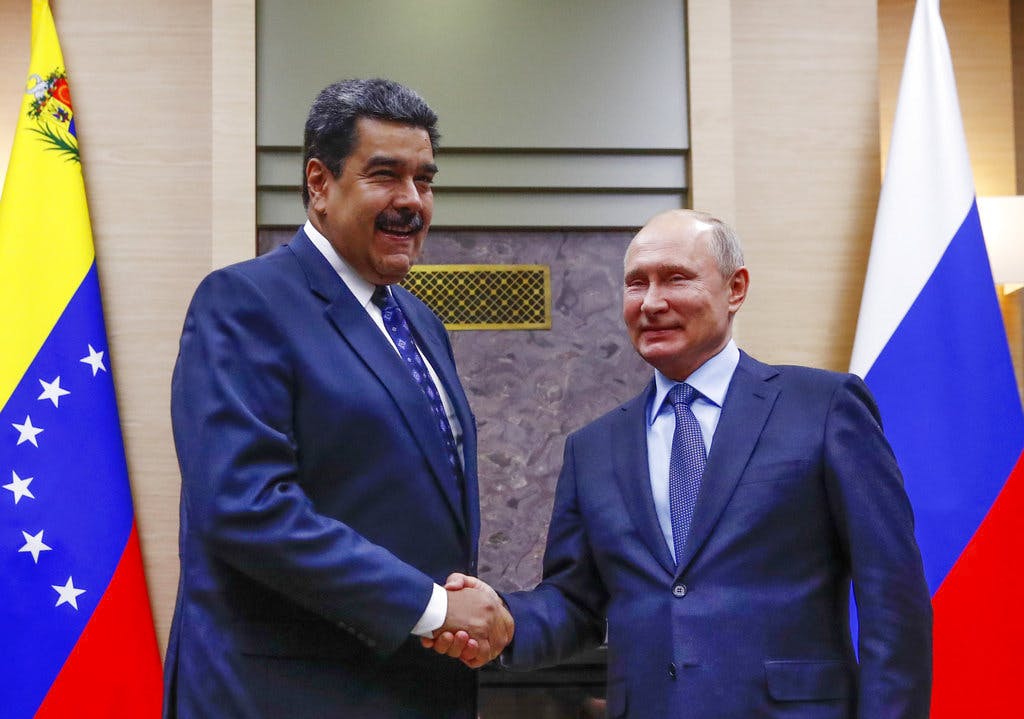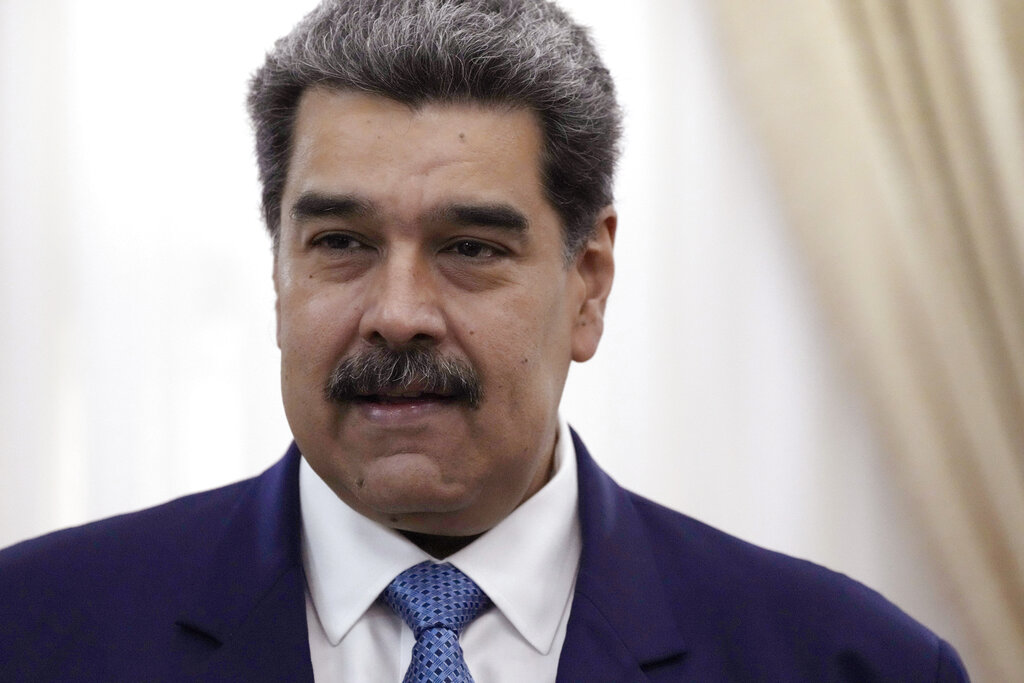Get Out Your Gunboats? War Clouds Scud Over Venezuela and Guyana
War clouds are scudding as Venezuela’s Marxist menace, Nicolás Maduro, is due to meet Thursday with Guyana’s democratically-elected president, Iraan Ali.

Around the globe, Washington juggles three crises: Russia’s invasion of Ukraine, Israel’s war with Hamas, and Chinese belligerence over January’s presidential election in Taiwan. Now, Venezuela’s revolutionary socialist president, Nicolás Maduro, is adding a new one, on South America’s northern coast.
Thursday, the Venezuelan dictator will meet with President Irfaan Ali, the democratically-elected leader of Guyana, Venezuela’s sparsely populated neighbor to the east. The goal is to head off South America’s first war since Argentina and Britain fought over the Falkland Islands in 1982.
Desperate to win re-election next year, Venezuela’s Cuba-trained president dredged up this fall a 200-year-old border dispute with Guyana. Acting on the results of a poorly attended referendum, Mr. Maduro declared last week that two-thirds of Guyana is now a Venezuelan state — Guayana Esequiba.
Mr. Maduro decreed that the area’s 125,000 residents — largely English-speaking Amerindians — are now Venezuelan citizens. He ordered Venezuela’s state oil and mining companies to enter the area. A swath of Amazon jungle almost half the size of New York State, the Essequibo is largely known to Americans as the location of Jonestown, the American cult that ended with the suicide of 918 members in 1978.

Mr. Maduro gave ExxonMobil, Hess Corporation, and all other foreign companies operating in the Essequibo zone 90 days to leave or to register under Venezuelan law. The Venezuelan leader’s threats are backed by a civilian population that is 35 times larger than Guyana’s 800,000 inhabitants, and by security forces that outnumber Guyana’s by almost 100 to one. Russia’s largest arms buyer in Latin America for decades, Venezuela has bought almost $20 billion of Russian arms: tanks, attack helicopters, and Sukhoi SU-301 fighter jets.
“Venezuela is annexing its 24th state, Guayana-Essequibo,” Russian parliamentary faction leader Sergei Mironov taunted Americans last week on X. “This is happening right under the nose of the once great hegemon USA. All that’s left is for Mexico to take back Texas and the rest. It’s time for Americans to think about their future, and also about Alaska.”
While the Kremlin cheers on its most important ally in Latin America, Mr. Maduro has his own reasons to stir the nationalist pot. Asserting sovereignty over the Essequibo is probably the only major point of agreement between Venezuela’s government and opposition.
Next year, he is to run for another six-year term. Two months ago, a wildly popular opposition candidate, María Corina Machado, won 92 percent of 2.4 million votes cast in a national primary election. That is probably more votes than were cast in Mr. Maduro’s December 3 Essequibo referendum.
Mr. Maduro, aged 61, is saddled with running on the legacy of a nearly quarter century of disastrous economic performance under his own 10-year rule and the 14 years of his immediate predecessor and mentor, Hugo Chávez Frías. Since Chávez was elected in 1998, Venezuela’s production of oil — the lifeblood of the economy — has plummeted by almost 80 percent, to 735,000 barrels a day, from 3.5 million in 1998.
Although Venezuela has the world’s largest known oil reserves — 300 billion barrels — Mr. Maduro wants more. Since 2015, foreign companies exploring Guyana’s Essequibo’s offshore waters discovered 11 billion barrels. Heightening Venezuela’s anxiety, Guyana opened bids in September for 14 additional offshore oil blocks for exploration and development.
The six companies and groups submitting bids included ExxonMobil, Hess, China National Offshore Oil Corporation, and France’s TotalEnergies, which partnered with companies from Qatar and Malaysia. Under Mr. Maduro’s decree of last week, all these companies would be banned from operating in Venezuela. This threat is weak. In 1975, all foreign oil companies in Venezuela were nationalized and converted into subsidiaries of Venezuela’s state oil company.
To intimidate foreign operators, Venezuela’s Navy intercepted American oil exploration vessels twice in the last decade. Last week, Mr. Maduro announced that he would build air strips and place military detachments near the disputed border. As tensions rose, a Guyanese Bell helicopter crashed last Wednesday in the forest near Venezuela’s border, killing five Guyanese officers aboard. The accident, the worst in Guyanese military history, was blamed on bad weather.
To defuse tensions, Brazil and the United Nations arranged Thursday’s presidential summit at the Caribbean island of Saint Vincent. Venezuela comes to the table with the diplomatic backing of Russia and Cuba. China is expected to remain neutral, partly because of the participation of China National Offshore Oil Corporation in a production consortium with ExxonMobil and Hess.
Yet Guyana has its own diplomatic backers. In a signal to Caracas, Brazil’s president, Luiz Inácio Lula da Silva, sent armored personnel carriers to two Amazon towns on Brazil’s 1,000-mile long forest border with Guyana. Brazil’s border with the Essequibo is about as long as Venezuela’s. But Brazil has had no territorial claims on its northern neighbor since 1904.
As a former British colony and the only English-speaking nation in South America, Guyana enjoys the backing of Britain, a backing that dates back to British success in 1899 winning an international arbitration in favor of what was then British Guiana.
Many countries in the global South do not want to see colonial-era border disputes reopened. Sympathy for Guyana is strong in the 56-nation, London-based Commonwealth of Nations. Similar support comes from the 32-member Organization of American States and the 15-nation Caribbean Community. Known as Caricom, this group is headquartered at Georgetown. Finally, as an Indo-Guyanese and as the only Muslim leader in the Americas, Mr. Ali enjoys sympathy of not only India, but of many Muslim nations.
However, as Russia’s invasion of Ukraine showed last year, world public opinion is not enough to deter a national leader from making steps that are economically irrational, but politically beneficial. With many analysts predicting that Venezuela will soon provoke border skirmishes, Washington’s stance is crucial. Last Thursday, the day after Guyana’s military helicopter crashed, Washington said the United States Southern Command was conducting joint air patrols with Guyana.
Secretary Blinken last week telephoned Mr. Ali, and reaffirmed the United States’ “unwavering support for Guyana’s sovereignty.” Earlier, America’s assistant state secretary for the Western Hemisphere, Brian A. Nichols, posted on X that Washington “supports Guyana’s sovereign right to develop its own natural resources” and that “efforts to infringe upon Guyana’s sovereignty are unacceptable.” On Sunday, Guyana’s president told reporters that he signed an advanced defense agreement with America.
In 1982, the Argentines invaded the Falkland Islands, triggering the war in which Britain sent forces to retrieve the islands. In doing so, Prime Minister Thatcher showed great courage. The following year it helped boost her to the biggest electoral victory in two generations. Could that history tempt President Biden to deploy American gunboats?

